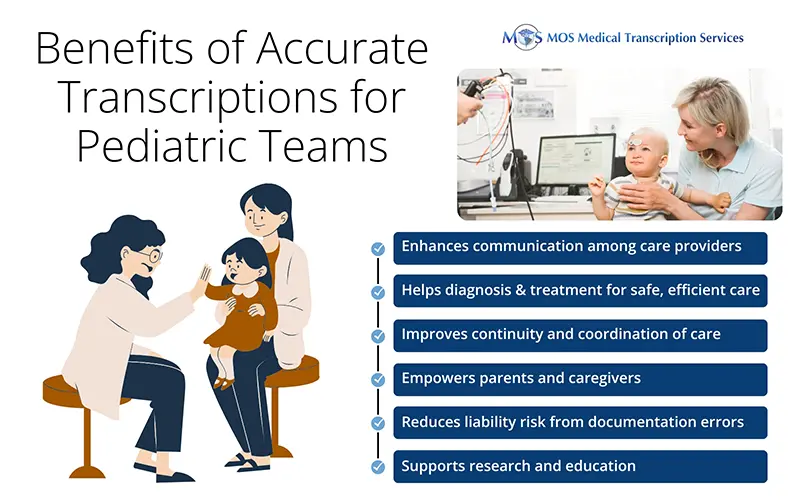Table of Contents
Caring for children goes beyond treating illnesses-it means supporting their overall physical, mental, and emotional development. A big part of this is proper pediatric documentation, which involves accurately recording a child’s medical history, physical exams, treatments, and conversations with families.
Physicians and care teams rely on these detailed notes, observations, and caregiver input to make the right diagnosis and treatment decisions. That’s why accurate medical transcription is so important. High-quality pediatric transcription ensures that every detail-no matter how small-is captured and easily accessible to the entire care team.
Many healthcare providers turn to specialized medical transcription company to maintain precise, reliable pediatric patient records and provide the best care possible.
Importance of Precise Documentation in Pediatric Settings
One of the main challenges of pediatric healthcare is that patients often cannot express their symptoms clearly. Accurate transcription to support pediatric patient care ensures that every detail is clearly documented, supporting early and precise diagnoses, timely interventions, and improved long-term outcomes.
Clinical decisions in pediatrics often depend on developmental milestones, immunization records, growth metrics, and caregiver feedback. This requires clear and timely transcription of physician dictation pertaining to several aspects.
Misinterpreting or omitting any information in transcription can lead to:
- Delayed diagnoses or misdiagnoses
- Improper treatment or medication errors
- Gaps in continuity of care
- Risk of non-compliance with pediatric care guidelines
- Billing mistakes and lost reimbursements
Relying on professional medical transcription services ensures clear and accurate pediatric clinical documentation.
How Accurate Transcriptions Support Pediatric Patient Care
Experienced transcriptionists can ensure accurate and timely documentation of pediatric encounters.
Key areas where transcriptionists can support providers include:
- Developmental history notes
- Diagnosis documentation
- SOAP notes for children
- Immunizations and vaccination schedules
- Well-child visits and milestone tracking
- Family and social histories
- Parental communication
- Medication management
- Patient age-specific screenings, testing, and measurements and anticipatory guidance
- Emergency care documentation
High-quality transcriptions ensure that every detail is captured and accessible to all members of the care team, supporting providers in various ways:
Helps Diagnosis and Treatment for Safe, Efficient Care
Accurate medical transcription plays a vital role in pediatric care by ensuring that every detail of a child’s health visit is clearly documented. In a field where patients may not be able to fully explain their symptoms, especially infants and younger children, the importance of precise documentation in pediatric settings cannot be overstated.
In pediatrics, even small details, such as a parent’s description of a child’s behavior or a physician’s verbal observation, can contain diagnostic clues. Precise documentation ensures that these details are clearly recorded, reducing the risk of missed or incorrect diagnoses.
Pediatricians rely on detailed patient histories, developmental milestones, vaccination records, and caregiver observations to make accurate diagnoses. Effective treatment depends on clear communication across the care team. Transcription helps turn these verbal notes into clear written records that are essential for continuity of care. High-quality documentation ensures that treatment instructions, medication changes, and care recommendations are correctly documented and easily accessible. This is especially important in pediatrics, where treatment may involve input from multiple providers and depend on a child’s age, weight, developmental stage, and caregiver preferences.
Enhances Coordination and Communication
Pediatric care involves collaboration among various specialists-pediatricians, developmental therapists, nurses, and sometimes child psychologists. Accurate, timely transcriptions of medical encounters support seamless communication, allowing every provider involved to understand the child’s history and care plan.
In pediatric cases, symptoms may be unclear or communicated indirectly through parents or guardians, precise transcription ensures that nothing important is missed. It also allows other healthcare providers-such as specialists, nurses, or therapists-to quickly understand a child’s condition and treatment plan. Well-transcribed notes support timely decisions. This is especially crucial for children with chronic illnesses or special needs. As technology evolves, these records can also be shared through patient portals, helping caregivers stay informed and involved in the treatment process.
Supports Legal and Compliance Requirements
Pediatric records must comply with strict documentation and confidentiality standards, including HIPAA regulations and parental consent laws.
Accurate pediatric patient care transcriptions help ensure:
- Effective capture and organization of key medical information
- Complete, legally compliant documentation
- Accurate billing and coding for pediatric services
- Preparedness for audits and defensibility if disputes arise
Empowers Parents and Caregivers
Parents often request access to their child’s medical records to track treatment progress, understand physician instructions, or share information with schools or other caregivers. Well-structured, error-free transcripts improve caregiver understanding, reduce confusion, and build trust in the care process.
An article from the American Academy of Pediatrics (AAP) explains that medical documentation was originally used to share information among healthcare providers, but now it also helps communicate with patients and their families, who are key members of the care team. In pediatric care, this can include adolescents who may have the right to manage parts of their own health. New technologies like patient portals, home monitoring devices, and mobile apps also make it possible for patients and families to help create and update medical records.
Assists in Research and Education
Well-documented transcripts provide detailed, real-world data that can be analyzed to monitor trends, identify gaps in care, and measure treatment outcomes. Researchers and quality improvement teams can use these records to study how care is delivered, track developmental milestones, or assess the effectiveness of clinical protocols—ultimately helping to improve patient safety and outcomes in pediatric settings.
For medical students, residents, and new healthcare providers, pediatric transcripts offer real examples of patient encounters. They help trainees learn how to document patient information accurately, understand clinical reasoning in pediatric cases, and see how communication with families is handled. Reviewing transcripts also helps them recognize the importance of clear and thorough documentation in delivering safe and effective care.
Overcoming Common Transcription Challenges in Pediatric Healthcare
Transcribing physician dictation in pediatrics comes with unique challenges that require extra care and attention. One major difficulty is interpreting indirect information, as small children cannot fully describe their symptoms. Transcriptionists must accurately capture details shared by caregivers and clinicians, including developmental observations and behavioral cues.
Medical terminology related to growth stages, vaccination schedules, and pediatric-specific conditions also adds complexity. Additionally, background noise in busy pediatric settings, fast-paced consultations, and varying provider dictation styles can make it more challenging to ensure accuracy.
Partnering with a company that specializes in pediatric medical transcription can help overcome these challenges and ensure that every critical detail is accurately captured-supporting safe, timely, and effective care. These transcriptionists are trained in child-specific clinical language and are familiar with standardized pediatric documentation templates. With regular quality assurance checks and audits, they help maintain high documentation standards that support accurate diagnoses, effective treatment planning, seamless provider collaboration, and compliance with legal and regulatory requirements.


